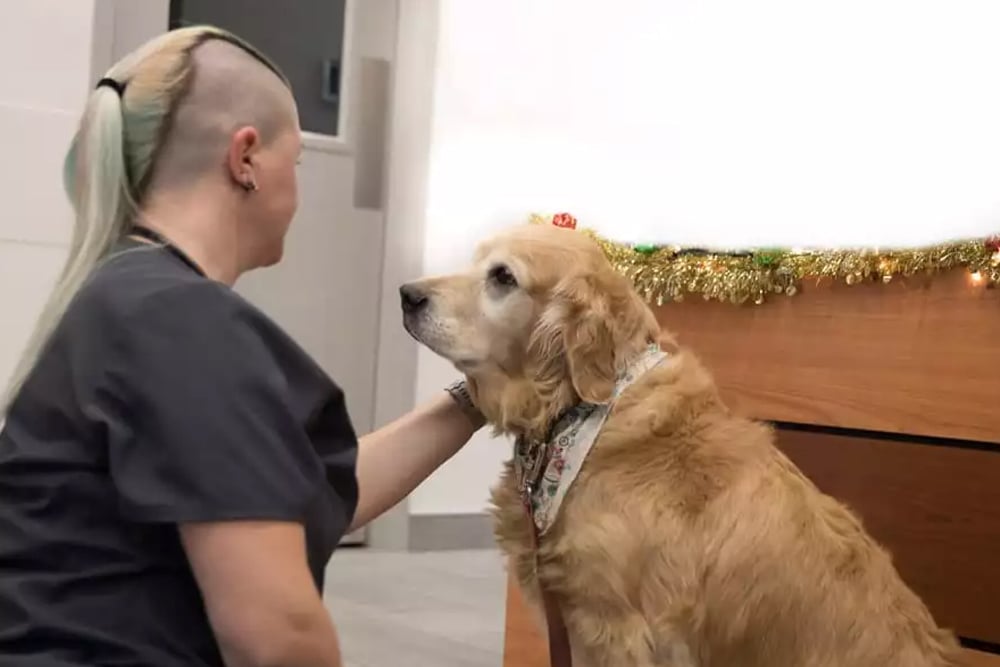
Reasons Why Your Dog Won’t Drink Water
Veterinary Emergency Group
Call & Speak with a doctor Open 24/7, Even Holidays!
Walk in today for:
Emergencies
Point-of-Care Ultrasound
Urgent Care
X-Rays
Diagnostics + Testing
End-of-Life Care
Surgery
Treatment + Hospitalization
As a pet parent you’ve probably had to mop up after your parched pooch gets a little too eager at the water bowl. While the cleanup is no fun, the real concern is when your dog refuses to drink water.
Just like us, dogs need their daily fix of H2O, too! Typically, one ounce of water per pound of their body weight helps ensure that they are hydrated. Double up on that if it’s a hot day or if your pup has been rocking some serious playtime.
Risk of dehydration is greater when the temps run high. Get ready for this fact—the only sweat glands dogs have are on their paws. What the what?! Yep, and that makes it more than a tad difficult to cool down fast. Keeping your pet’s water bowl handy and full helps them stay cool and hydrated.
MY DOG WON’T DRINK WATER. WHAT’S GOING ON?
Several factors may be contributing to why your dog is steering clear of the water bowl.
SHUFFLE OF THE SEASONS
Changing weather is a common reason dogs often slow down their water intake, stressing out their parents. But don’t hit the panic button just yet! Cooler temps may simply mean they’re less thirsty and the same goes for a less active pooch.
Without a high level of exertion, dogs may not be as interested in slurping up a gallon of water. This is completely normal as long as they stay hydrated and don’t stop drinking completely.
UNFAMILIAR PLACES
Sometimes all it takes is a new place for your typically predictable pup to turn its nose up at a bowl of water. Blame it on their ancient survival instincts. When their sensitive snouts smell a water source that isn’t familiar; they think it might be unsafe. To help your dog gain interest in water, pack a familiar bowl from home.
Moving to a new home can also pose a challenge for your dog. Like some humans, unfamiliar surroundings, smells, and sights can be overwhelming and may take time for them to adjust.
HEALTH HURDLES
If you notice your pup is showing other symptoms like lethargy or loss of appetite, and you suspect something may be wrong, don’t hesitate to call your veterinarian or an emergency vet. Be sure to keep an eye on your dog’s water intake—it’ll be useful info for the vet.
AGE-OLD REASON
As your furry friends age, they might not gulp water like they used to. It could happen because it now takes an effort to get to their water bowl in the next room. Or simply because their thirst and hunger receptors start to take a backseat. Since older dogs aren’t as active, it’s also expected that they won’t drink as much water.
Still, it’s important to ensure that your older dog drinks some water. Pro tip: switch to wet foods so your dog can get hydrated without depending only on their water intake.
NEGATIVE ASSOCIATION
Some dogs may link drinking with a negative experience. For example, if you have a shelter pup, they may have had a run-in with another dog over a shared water bowl.
PICKY POOCH
The mystery of your pup’s H2O hiatus may just be that your fussy friend doesn’t like the bowl or where it’s located. If this seems likely, consider getting a brand-new bowl and placing it in a different location. It may just be a quick and easy solve to this quirky canine mystery!
MOUTH MISHAP
A mouth injury could be another reason why your dog isn’t drinking water. Check for splinters, plastic, or even small stones lodged anywhere in the mouth area: gums, inside of their cheeks, tongue, and in between teeth. If you find something and it can’t be easily removed, reach out to your primary vet or VEG for help.
TEETH TROUBLES
Dental issues could be preventing your pup from drinking. The sensation of cold water can be uncomfortable on their sensitive teeth, making them avoid it. See your primary vet for dental issues.
A PANICKED PUP
Anxiety can also be the reason your dog has stopped sipping lately. Life changes can cause separation anxiety, like a kid leaving for college, a death in the family, or a divorce. This can impact your canine companion’s appetite and thirst.
HOW TO PROVIDE YOUR DOG SOME SIP-SUPPORT
Try these tips and tricks to get your pup to start drinking water:
- Add a splash of water to moisten up dry food
- Offer ice to snack on for a crunchy, calorie-free treat
- Try a fresh bowl or change its location to spark their interest
- Give Pedialyte, low-sodium soup broth, or juice from canned chicken or tuna.
If you still aren’t getting anywhere after 24 hours, call your vet and discuss what’s going on. Don’t let it escalate to a point where your dog is parched—contact an emergency vet at VEG if needed.
At every VEG location, our emergency veterinarians are available 24 hours, 7 days a week and are fully equipped to offer the best treatment plan to make sure your pet stays healthy, happy, and hydrated!

